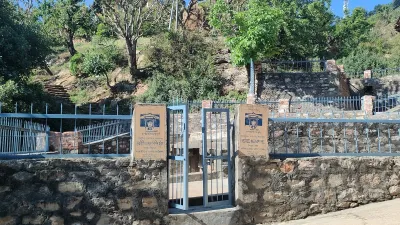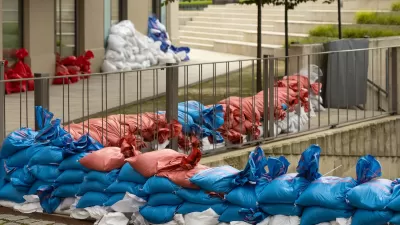Developers of Sterling Ranch, a proposed master-planned community in Colorado, want its future residents to curb their water use. One way they're ensuring this is by nixing traditional, lush lawns from their plans.
"Yards will be sunk down a couple inches below the sidewalk so they act as a bowl, soaking up moisture. Any runoff -- or rainwater -- that does hit the pavement will flow down into 55,000-gallon cisterns built under the streets. That water will be available to homeowners for outdoor irrigation. But it will be rationed tightly.
'You abuse exterior water use, we'll warn you, fine you, and then we will shut your water off,' says Jack Hoagland, another development partner. 'So sue us,' he says, chuckling. 'We'll take care of water hogs.'
All athletic fields in Sterling Ranch will be artificial turf. If the technology pans out, tall poles with photovoltaic panels on top may be planted in the bottom of the communal reservoir to act like giant parasols, shielding the stored water from evaporation.
All of which makes some neighbors uneasy. Nearly 400 have banded together to criticize the development. They are concerned about the added traffic and the visual clutter. But most of all, they worry about water.
Though the developers promise that drought-tolerant landscaping can be lush, neighbors fear it will look bleak and barren. They don't like the idea of artificial turf plunked down on their prairie. And they worry that future residents of Sterling Ranch will demand far more water than developers are budgeting, leaving other parts of the county high and dry."
FULL STORY: In Arid West, Lawns Get Trimmed -- From Plans

Alabama: Trump Terminates Settlements for Black Communities Harmed By Raw Sewage
Trump deemed the landmark civil rights agreement “illegal DEI and environmental justice policy.”

Planetizen Federal Action Tracker
A weekly monitor of how Trump’s orders and actions are impacting planners and planning in America.

How Atlanta Built 7,000 Housing Units in 3 Years
The city’s comprehensive, neighborhood-focused housing strategy focuses on identifying properties and land that can be repurposed for housing and encouraging development in underserved neighborhoods.

In Both Crashes and Crime, Public Transportation is Far Safer than Driving
Contrary to popular assumptions, public transportation has far lower crash and crime rates than automobile travel. For safer communities, improve and encourage transit travel.

Report: Zoning Reforms Should Complement Nashville’s Ambitious Transit Plan
Without reform, restrictive zoning codes will limit the impact of the city’s planned transit expansion and could exclude some of the residents who depend on transit the most.

Judge Orders Release of Frozen IRA, IIJA Funding
The decision is a victory for environmental groups who charged that freezing funds for critical infrastructure and disaster response programs caused “real and irreparable harm” to communities.
Urban Design for Planners 1: Software Tools
This six-course series explores essential urban design concepts using open source software and equips planners with the tools they need to participate fully in the urban design process.
Planning for Universal Design
Learn the tools for implementing Universal Design in planning regulations.
Jessamine County Fiscal Court
Caltrans
Institute for Housing and Urban Development Studies (IHS)
City of Grandview
Harvard GSD Executive Education
Toledo-Lucas County Plan Commissions
Salt Lake City
NYU Wagner Graduate School of Public Service





























